- Nameadmin
- Date2016/03/08 00:00
- Hit532
“The 2nd Asia-Pacific Business Forum: Korean CCUS Technology for Climate Change”
was held in Bangkok, Thailand
In the Paris Agreement at the 2015 United Nations Climate Conference (COP 21) a new climate accord which all countries cooperate for global climate change has been established.
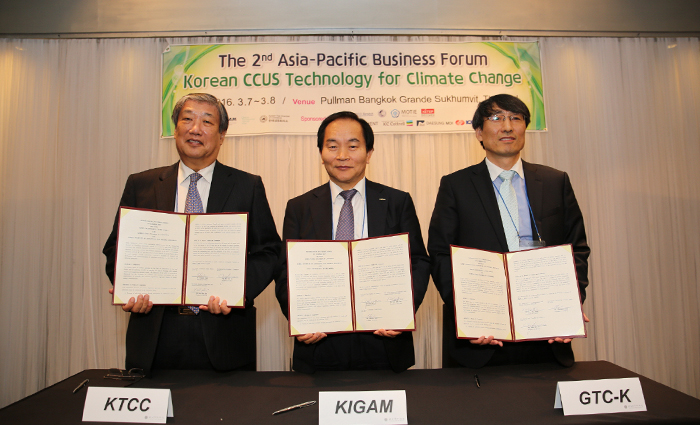
As per the Post 2020 new climate change system, countries are expected to share and enhance technologies for the reduction of greenhouse gases in developing countries as well as allowing for an open and global carbon market.
Accordingly, Korea has made efforts to achieve carbon reduction and utilization technology for the better usage of the resource. With its world-class carbon utilization technology, the Korean Institute of Geoscience and Mineral Resources (KIGAM), under the Ministry of Science, ICT and Future Planning, is establishing and promoting diverse projects that are aimed at developing countries.
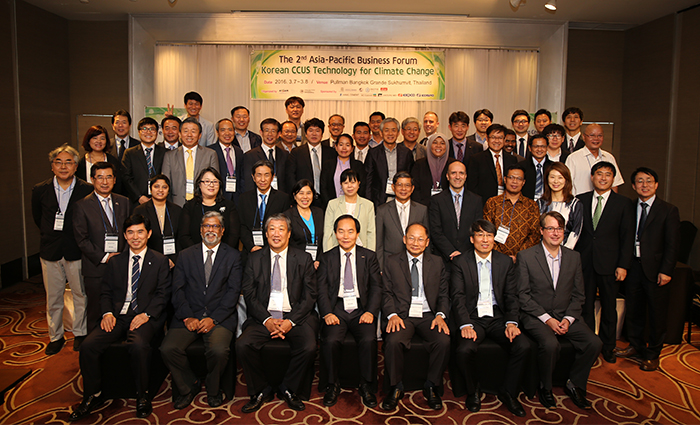
On March 7, the international event for the ‘The 2nd Asia-Pacific Business Forum: Korean CCUS Technology for Climate Change’ took place at Hotel Pullman Grande Sukhumvit. The forum will continue for the following two days.
This event has been co-hosted by The Korean Institute of Geoscience and Mineral Resources (KIGAM, President Kyu Han Kim), Green Technology Center (President Changmo Sung, GTC-K) and the Korea-Thailand Chamber of Commerce (CEO Man Jae Lee, KTCC), supported by UNESCO, Coordinating Committee for Geoscience Programmes in East and Southeast Asia (CCOP) and other institutions. Among the participants are President Kyu Han Kim of KIGAM, UNESCO-BGK Programme Specialist & Chief of Natural Sciences Ramasamy Jayakumarb, Director Adichat Surinkum of CCOP Technical Secretariat, Director-General Hyun Woo Shin of Green Technology Center and other international institutions and business representatives.
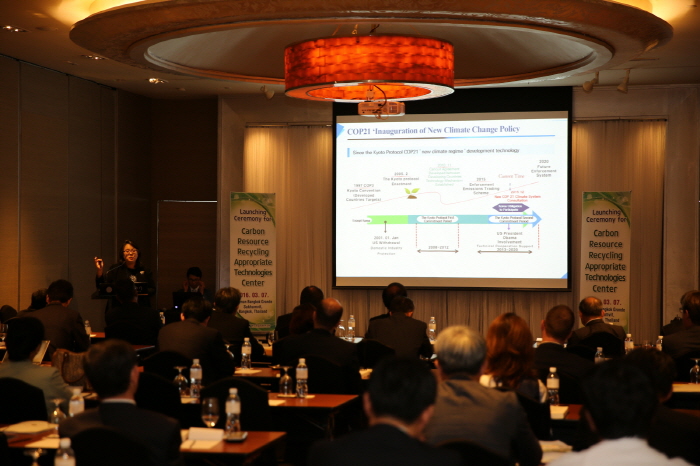
The opening ceremony was proceeded by the main event of the forum, the ’carbon utilization technology business’ launching ceremony. A project team has been created for the expansion of climate change countermeasure technology to developing countries that KIGAM is conducting with UNESCO, the Korea-Thailand Chamber of Commerce, CCOP and advanced research institutions.
The team is undertaking the following for the international application of the Korean Climate change carbon mineralization technology such as the green cement technology and CO₂paper recycling technology:
1) KIGAM acquired a world-class technology that facilitates the recycling of low concentration CO₂produced from power plants, cement and paper industries.
2) Technology for the production of low carbon-high quality cement through industrial byproducts was successfully demonstrated by KIGAM in 2012 and it is receiving spotlight from developing world countries that are still heavily reliant on coal-fired power generation.
3) Technology that allows usage of CO₂produced from paper industries for paper recycling. KIGAM succeeded in demonstration of this in 2014.
Through the usage of UNFCC technology mechanism implementing agency CTCN (Climate Technology Center-Network) the business team will deliver customized technology (solutions to household waste, lack of water, toilet water, green tide) to developing countries in the Asia-Pacific region according to their needs.
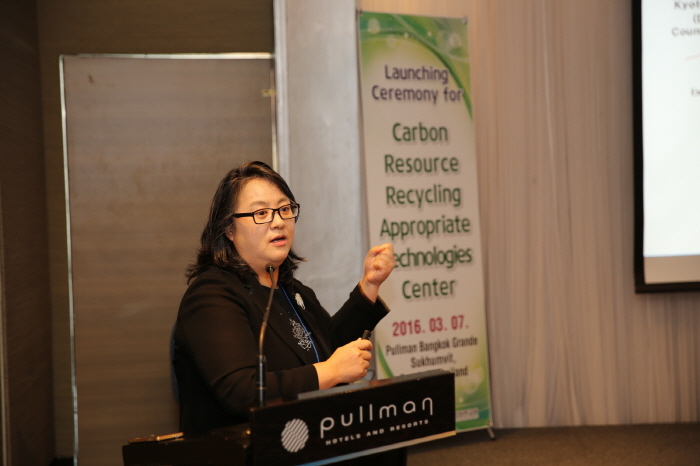
Dr. Ji Hwan Ahn, Principal researcher at KIGAM, introduced the CO₂paper recycling technology* (discarded paper pulp In-situ) as a model for industry-academia-research cooperation. KIGAM and UNESCO introduced the system of Carbon-Money with used paper collected by citizens and students that can be used in purchasing books and other materials with the accumulated mileage. Additional activities include the distribution of paper collection vending machines and civic education that will be first implemented domestically then expanded to developing countries through technical assistance.
* UNESCO is promoting education of global citizens as its core business and is planning a business model to apply technology to reduce greenhouse gas emissions in developing countries. UNESCO-BGK, in charge of all educational projects and geological resources has concluded an LOI(Letter of Intent) agreement on February 3rd for the transfer of Korean climate change countermeasure technology and technical assistance for developing countries.
Participants of the forum include professor Michael Hoffmann from Caltech (California Institute of Technology), 1st prize winner in the ‘Reinvent the Toilet Challenge’ hosted by Bill Gates and Melinda Gates Foundation, along with other representatives from Harvard University, Tokyo University and University of Queensland to introduce the latest climate change countermeasure technology. Representatives from the local government of Thailand and other Southeast Asian countries, Korean and Thai corporations have participated to introduce the efforts made by the government, business and academia and discussed the establishment of an international cooperative system.
Additionally, KIGAM, GTC-K and the KTCC signed an MOU agreement for the establishment of an international industry-academia network for the climate change countermeasure technology. The three institutions will enhance their cooperation regarding the transfer of Korean climate change countermeasure technology to developing countries.
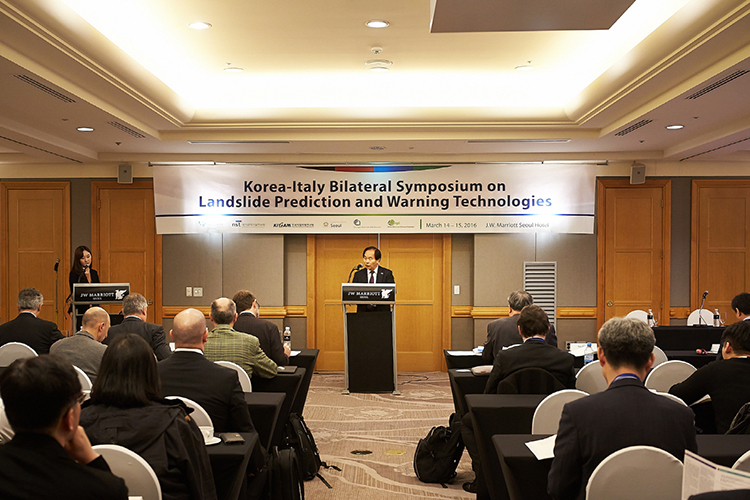
President Kyu Han Kim of KIGAM said “In the midst of a low growth rate, the reduction of greenhouse gases through a convention of climate change is not a risky act, but rather a new opportunity for the current world economy. He also mentioned that “To acquire a carbon mineralization market full of potential, we will build a systematic ground for developing countries with our world class technology."